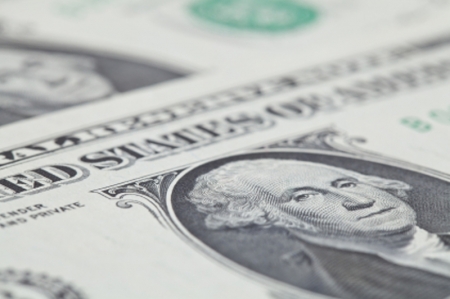Dollar climbs to one-year peak; Powell’s speech in focus
2024.11.14 05:13

Investing.com – The U.S. dollar pushed further higher Thursday, climbing to a one-year peak after consumer inflation data raised doubts over the extent of Fed interest rate cuts, while Donald Trump started filling the key positions in his new administration.
At 04:35 ET (09:35 GMT), the Dollar Index, which tracks the greenback against a basket of six other currencies, traded 0.4% higher to 106.807, its highest since early November 2023.
Dollar pushes further ahead
US was reported largely in line with expectations in October, according to data released on Wednesday, but the headline CPI rate still rose from the prior month, while remained well above the Fed’s 2% annual target.
While the reading spurred bets that the Fed will still cut interest rates by 25 basis points in December, the long term outlook for rates grew more uncertain, helping the dollar.
This uncertainty over likely Fed rate decisions has been added to by Donald Trump’s victory in the US presidential election last week, with his likely policies of lower taxes and trade tariffs widely seen as inflationary.
Trump has pressed ahead with appointing loyalists to key positions, including Marco Rubio as Secretary of State. The Florida senator is widely seen as likely to take a hard-line towards Iran and China.
“We think this week’s price action has given us a taste of what’s to come in FX markets in this second Trump term, with brief dollar corrections taken as an opportunity to enter structural USD longs at more attractive levels,” said analysts at ING, in a note.
An address by Fed Chair later in the session will likely provide traders with more cues on interest rates in the wake of the central bank’s decision to cut rates by 25 basis points last week.
Euro heading lower
In Europe, traded 0.2% lower to 1.0538, at its lowest level in a year ahead of the release of the latest for the eurozone.
Preliminary figures in October showed the bloc grew faster than market watchers expected in the third quarter from the previous three months, but quarterly growth of 0.4% showed the eurozone economy remained fragile, with the largest component – the German economy – particularly weak.
The German Council of Economic Experts cut its growth forecasts for Europe’s biggest economy for 2024 and 2025 on Wednesday – revising the forecast for this year to a 0.1% decline in gross domestic product from growth of 0.2%, and its 2025 growth forecast to 0.4%, down from 0.9% growth.
The single currency is also struggling with the political uncertainty in Germany, as well as the potential for tariffs against Europe from the new Trump administration.
“We strongly believe that since 5 November we have entered a phase where a euro-negative risk premium will become the new normal given the risks to the eurozone associated with Trump’s foreign/trade agenda,” ING added.
rose 0.3% to 1.2664, falling to its lowest in three months at $1.2683, with sterling pressured by the rampant dollar.
The cut interest rates last week, for the second time this year, but policymaker suggested that further reductions could be delayed.
High inflation in Britain has not been vanquished, she said in a speech on Wednesday, and it is more likely to overshoot than undershoot Bank of England forecasts over the medium term.
Mann voted against cutting borrowing costs at last week’s policy-setting meeting, the sole dissenter, and she also opposed an initial rate cut in August.
Yen nears intervention levels
rose 0.4% to 156.00, with the pair at a more than three-month high, and close to levels that had last sparked currency market intervention by the government.
climbed 0.3% to 7.2428 to a three-month high, with sentiment towards China strained by the prospect of high U.S. trade tariffs against the country, under a Trump administration.
fell 0.3% to 0.6466 to a three-month low, after data showed Australia’s job market growth cooled in October from six straight months of strong growth.
Reserve Bank of Australia Governor said that interest rates were unlikely to rise any further, but would remain steady until the bank was confident that inflation was easing further.







